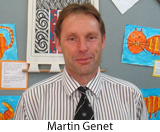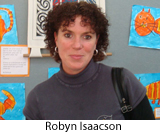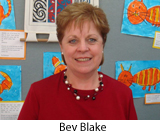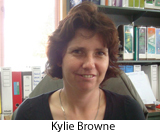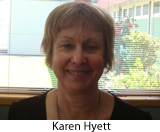Manawatu, Wanganui, Taranaki, and Hawkes Bay (archived)
Flaxmere sector story
Interview with Stephanie Geddes – School Support Services Massey University
Leading and managing advisers from Massey University School Support Services provided two in-depth training days for school leaders. Following these, schools set up their own regional professional learning communities. The Flaxmere community has met once a term this year and this has provided opportunities for school leaders to focus on the document and to participate in professional learning conversations.
“Sector leaders are enjoying their roles in facilitating other school leaders and there is a sense that everyone wants to ‘get it right’ which has meant going slowly to build a greater sense of understanding," Stephanie explains. “Advisers are participating in their own ongoing professional development, especially with regard to the key competencies. The NZC is exciting and different and we’re encouraging schools to explore it and understand the content before they start to make changes.”
“We feel there is a push for leaders to be pedagogical leaders and that this is an issue we need to think about. There are questions arising around this such as how do I coach people and how do I mentor people? How do I help people to effect change in their classrooms? When we start concentrating on effective pedagogy, then school leaders start to say, ‘What can I do to help make and sustain these changes?’ We need to remember, too, that this all connects with the programmes that are currently in place for teachers and leaders and that the curriculum supports these.”
Interview with Flaxmere sector leaders and teachers
More than anything this is a story about collaboration; it is an illustration of how this cluster of schools has worked together this year talking, thinking, reading and sharing ideas. From this they’ve constructed a planned approach to introducing the curriculum into their schools and reported back to the cluster each term.
Peterhead School principal, Martin Genet explains, “We’ve acknowledged the need for collaboration; it is not OK to isolate ourselves in our own classrooms and schools any more, we need to learn from each other. We’ve tried to open up the doors to share what we’ve been doing in our cluster. This has highlighted how you can’t just take what someone else is doing and make it yours without having that deeper understanding of how the practice has come about. We are helping to create a framework in the cluster but people have to work through the thinking themselves, they need to be asking themselves questions about their own needs and the needs of their own students and communities.”
The Flaxmere professional learning community facilitation has been shared by Bev Blake (Flaxmere Primary principal), Robyn Isaacson (Flaxmere Primary DP) and Martin Genet (Peterhead School principal).
“We felt the work load for a sector leader was too much for one person, so we decided to share the job between three of us. We’ve all had experience as facilitators and we felt our area would benefit from our combined expertise” says Bev.
The action plan
The cluster started the year by deciding to meet once a term with the principal and lead teacher from each school. At the initial meeting they organised the MOE teacher-only day into a mini conference, using their own and visiting experts for keynote address, discussions and workshops. Since then the meetings have evolved and the needs of the group have become apparent.
Martin says, “We started with an overall cluster action plan, which filtered down to school action plans, but one of the things this highlighted was the way we could combine not only our school resources but the various initiatives we were involved in. Although it has been essential to bring outside expertise in at times we also have a lot of knowledge and expertise among our own cluster. We’ve become very good at thinking about the various options we have available to us at home so that we can make progress rather than always waiting to buy in expertise which takes time and money.
“As cluster leaders we’re organised and we plan ahead. We ask questions of the group, finding out what their needs are and what they want to do. We try to be supportive, too, and stay in contact. We also have a fairly rigorous report back process, where everyone has to show and tell what they’ve been doing. We ask them to bring evidence of this to the meetings and we follow this up with learning conversations. A number of our schools have been on PD sessions and we’ve asked for feedback about this.”
Bev adds, “One of the things that has been great about our cluster has been bringing people together to discuss how to go about constructing your own curriculum; being able to share the things we’ve learned from attending courses. Not everybody has been able to go on courses as private consultants have run them, and we’ve had to pay to attend, so it’s been really valuable especially for the smaller schools.”
Taking time
“We needed to really challenge ourselves to think about and discuss the way to go and not to rush the process. We wanted to become familiar with the language of the document so that it became our currency, something we all understood. By reading and thinking and meeting together and sharing our combined understanding we formed a common understanding about the way to go that then lead on to forming an action plan in each school” says Martin.
Tineka Tuala-Fata is the deputy principal at Peterhead School. “Our professional learning community is slowly working through our own curriculum journey. I think it’s a journey that everyone needs to go through to develop the currency of the new curriculum. Unraveling the old ideas about curriculum takes time but it’s an important part of the learning we all need to undertake, building our new understandings about the new curriculum.”
Bev explains, “The work we’re doing is based on the needs of our communities, so even though it is transferable to other schools, these are ideas we’ve all worked on and it’s the thinking and talking we’ve been involved in that has been essential in developing the curriculum design we have in each school. In putting our action plan together we asked ourselves, where we are now? What are we doing at each school? Where do we want to go? We just had to make our own way and make mistakes as we went and change what we were doing as we found or heard about different ways of approaching this.”
Key Competencies
The Flaxmere cluster decided to focus on the key competencies, to build an understanding of what they would look like in practice and how they could be incorporated into the teaching and learning programmes so that they were recognisable as key competencies. They decided first to concentrate on the key competency ‘thinking’.
Tineka outlines the Peterhead approach. “At Peterhead School we looked at what informed the theory behind the key competencies, then we looked at why it’s important to be thinking about the key competencies as part of a holistic approach to curriculum design rather than as separate components. We spent time as a staff looking at the connections between curriculum areas and at the way everything we do in teaching and learning is connected and linked. We’ve tried to understand what the concepts mean in relation to the students we teach and we always come back to looking at the needs of the children in our community and their experiences. We’ve tried to move beyond the notion of looking at the concepts we’re discussing and tagging them as tools that are part of a teaching package.”
Kylie Browne, a classroom teacher at Flaxmere Primary School, explains how they have put this into practice. “Our first job as a staff was to think about how we would plan, as we no longer had the essential skills as the basis for our planning. With this in mind, we spent time looking at the whole curriculum and trying to embed the key competencies into our planning. This year we’ve been trialing then redesigning this right across our school. We bring our ideas about what works and what doesn’t to regular meetings where we talk about our plans in action and reflect on how it’s working. Our cluster decided to focus on “thinking”, so we spent time first with Georgette Jensen looking at how this would work in our programmes, what we would have to do … to incorporate thinking as a key competency. We decided on activities, skills and strategies related to thinking but we also needed to think about our learning intentions and success criteria. Whereas before we would have started with the achievement objectives and worked on how to fit things in, now we begin with our learning intentions and make links back to the curriculum. So now instead of thinking about things we must teach, we look more at the needs of the children and make links to the curriculum.”
A culture of learning
The cluster is committed to developing a culture of learning. Tineka explains how this has happened at Peterhead. “With the new curriculum we decided to focus on building a culture of learning. We looked at ways this could happen and one of the things we came up with was our ‘Peterhead Learning Portfolio’, which is basically a reflective journal. We use this as a follow up to any PD we have, writing about the action we’re taking in our classrooms. We then write reflective thoughts about what we’ve done and take this to discussion sessions. Even though the journals are personal and we can write what we like, they are a professional document and we have a format to follow. In Term one teachers set their learning pathway for the year. They look at some personal learning goals for themselves taking into consideration: our school professional development; where we’re headed with our strategic plan; formative practice and a personal learning focus. The second section of the portfolio is related to our classroom observations. We set this up to break down the fear that many of us had about sharing what was happening in our classes. We set up small clusters within our syndicates and the teachers discussed the observations and carried them out within these groups. The feedback we have from these is that observations are wonderful learning tools for the observer. You learn more about yourself by observing than you do about the other teacher. It enables you to see things you want to try, it helps you reflect and ask questions about your own practice.”
Karen Hyett, the associate principal at Peterhead adds, “We’ve also done work on professional learning conversations, in particular the work we did with our AToL facilitator around this has been valuable. We practiced what giving good feedback would look like and sound like, so our first round was to do with observation, then our next round was a professional discussion about how to give good feedback. We then moved onto personal challenges we might have in our teaching; the challenges were shared then everyone gave feedback based on the work we had done on learning conversations. We had facilitators in to help us with this. Many of the challenges teachers shared were around management of students and the difference with these groups is that now, as well as working collaboratively which has been part of our school culture for a long time. We were learning skills about how to be helpful to each other in our learning conversations.
We’ve tied these innovations into our appraisal process. People now come to their appraisal meetings with evidence they’ve been collecting for the year in professional learning groups, our learning conversations and challenges which are all part of our reflective writing in the learning portfolios. There is a real culture of learning within the Flaxmere cluster. We’ve done a number of contracts together now and we know each other well. We’re able to share ideas. There’s a lot of expertise within each school, which is quite a powerful tool.”
DP at Peterhead School,Tineka Tuala-Fata was interviewed for this EDtalks video. She discusses the process of change from the perspective of a school leader outlining several key factors in the context of The New Zealand Curriculum, including the need to have a strong belief in any planned changes.

